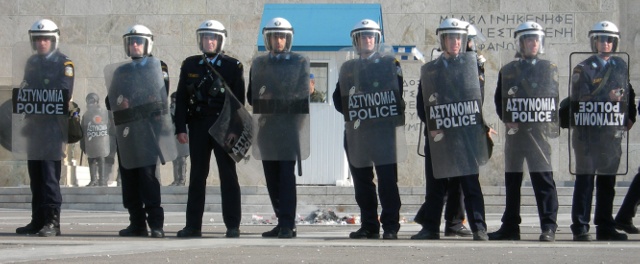THЭ VЭRΔICT: The Case of Irianna VL, Part 2
 Athens police monitor a protest. https://flic.kr/p/5HS6LE
Athens police monitor a protest. https://flic.kr/p/5HS6LE
For Part 1 of this story: https://www.mironline.ca/thэ-vэrδict-case-irianna-v-l/
This two part story of justice comes to a screeching impasse almost six years after its beginning. Arrested in the summer of 2017, Irianna is put on trial for suspected involvement in a Greek terrorist organization.
Having been through several tedious drills before, albeit not as serious as this one, Irianna and her loved ones were said to not have been too worried about the outcome of the trial. After all, the evidence was lacking at best and if the prosecution’s main line of accusation was centered around her boyfriend, who was previously cleared of all charges, then surely she would be fine.
In an open letter following Irianna’s incarceration, Konstantinos stated that no outsider would understand how the trial played out unless they were in the courtroom. The prosecution reportedly kept asking Irianna about her relationship with Konstantinos and his alleged ties to members of the ΣΠΦ despite the fact that he was cleared of all charges.
The faulty DNA evidence found on some unused abandoned weapons holding Irianna accountable was also addressed, but in a bewilderingly dismissive manner for evidence that is so scientifically crucial to her sentencing. The partial DNA match that had originally been found was said to have been of bad quality in the first place and was likely a possible match to 8 or 9 other people in the world. This was coupled with the fact that the witness who discovered those guns all those years ago reported a man at the scene. Certain news outlets maintain that it was highly improbable that a sample of DNA that has 8 or 9 matches in the entire world will have a second match in the same region. When asked whether they could test the DNA sample again the police department replied that the sample had run out.
It is with this main evidence as well as some trips abroad Irianna proved were for her PhD research, that the jury sentenced her to 13 years in prison. The decision sparked national outrage and debate that only grew in momentum when Irianna, along with another young man who had been sentenced on dubious charges, asked for a retrial that yielded similar results. When the verdict was yet again. handed down on a hot summer day in mid July, anarchists protests erupted, smashing store windows and setting fires in the center of Athens to avenge Irianna and Periklis, the other young man sentenced. his probably set back the campaign for their freedom rather than helping it.
Although the demonstrations on Irianna’s behalf could be seen as evidence of her involvement with the group, it is important to note that this trial carries a lot of political implications with it. Greek leftists, both moderate and extreme, have long complained that the law treats leftist defendants in a much harsher manner than they would right wing conservative defendants. This in itself can account for the disruptive protests carried out by the left on the day of the retrial, especially when looking at Greece’s track record of prison sentences where certain white collar crime or other right wing criminals are concerned.
The timing of Irianna’s trial also fueled this argument. In late May of that summer, a car bomb exploded in the vehicle of former PM Lucas Papadimos, injuring him in the process. Police recognized the bomb as being similar to the ones sent to German finance ministers for which ΣΠΦ had claimed responsibility. The public was understandably alarmed and pressure on law enforcement institutions to address the problem grew. This could have provided the motive for a botched and hasty trial.
No one knows if Irianna is innocent. The problem is, judging by the evidence used to convict and sentence her, no one can be anywhere near certain that she is guilty either. The case of Irianna V.L. is a disturbing one primarily because of the clear amount of reasonable doubt. A young woman having to spend 13 years in prison because of shaky evidence is a shocking story but the implications of how easily she was incarcerated is what most alarmed members of the Greek population. Are rumoured acquaintances or mutual friends on Facebook now a substantial enough argument for the prosecution to condemn defendants? Can faulty and inconclusive scientific evidence now be accepted as fact at trial? The reason these laws are absolute and the idea of ‘beyond reasonable doubt’ has been introduced is so that unfair or mass incarceration can be limited in a fair, democratic society. Can a country famed for aiding the foundations of law and justice as we know it today, ultimately be a nation that fails it?
The Jury is still out on this one…
Edited by Gracie Webb.
